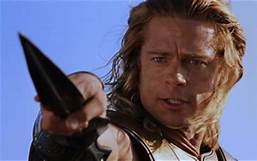Recommended by Mister H.
We spoke last week about the Invocation of the Muse from Homer’s Odyssey [translation by T.E. Lawrence] … and the tattered copy of that prayer that I still have (and still recite each morning) from my dear friend and mentor, Paul Rink.
Today let’s talk about the composer of that prayer, the epic poet Homer. Who was he anyway? And why should we pay attention to anything he did or said?
Homer is the author (though of course his works were originally meant to be sung or recited orally) of the Iliad and the Odyssey. Are there two greater works in the Western canon? Does Western Civ in its entirety not derive, pretty much on every level, from these two sagas? Would not Shakespeare himself pass the prize of honor to Mister H?
The Spartans believed that the Iliad was the only work that their young men, and probably young women as well, needed to know to complete their educations as citizens. All wisdom and ethics were, they believed, contained therein.
Alexander the Great slept with a copy of the Iliad—annotated by his tutor, Aristotle— beneath his pillow.
 Brad Pitt as Achilles in “Troy”
Brad Pitt as Achilles in “Troy”As for the Odyssey, it was and remains the archetypal “hero’s journey” saga of Western civilization. A case could be made that virtually every drama, novel, epic, comedy and even videogame and hip-hop song descends from this single document and follows the structure and narrative principles it embodies.
We can safely declare, I believe, that Homer knew what he was talking about.
So what does it mean that he started the Odyssey with the Invocation of the Muse that we cited (and wrote out in its entirety) last week?
Was Homer serious? Was he truly invoking the aid of the goddess as he embarked on his great opus? Or was this just a literary trope, a style of intro, a formality without real meaning?
I can’t prove it but I believe Homer meant every word. I think he was expressing a universal truth that all writers and artists know—that they, the artists, are not the true authors of the works they produce but that the narrative or visual image or music comes through them from some source they cannot define or locate and whose very existence they cannot prove. Homer, like his fellow Hellenes, anthropomorphized this source. He gave it a face and a name. He addressed it as “Divine Poesy, goddess, daughter of Zeus.”
Homer did the same in the opening verses of his other great work, the Iliad.
Sing, goddess, of the wrath of Achilles, Peleus’ son, which brought pains thousandfold upon the Achaeans, hurling in their multitudes to the house of Hades strong souls of heroes …
In last week’s post, I wrote about my friend Paul Rink typing out the Invocation and giving it to me as a kind of blessing or benediction upon my fledgling career. Like Homer, Paul believed that it only made sense, before we as artists sat down to work, that we take a moment to show respect for the mysterious (female) force that we hoped would guide and inspire us and that we humbly invoke her favor upon our enterprise.
“If it was good enough for Homer,” Paul said, “it should be good enough for you and me.”
The post Recommended by Mister H. first appeared on Steven Pressfield.


